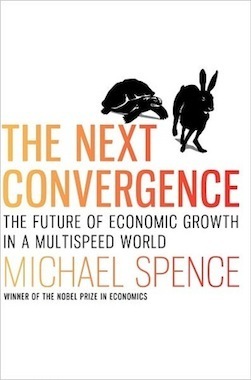The Next Convergence

Michael Spence's The Next Convergence: The Future of Economic Growth in a Multispeed World is a bit all over the map as a book. But in essence it's one very good book about rapid growth in developing countries and the implication of the fact that it's now happening on a sufficiently large scale as to have macro-impact on the world as a whole. There's lots of other stuff in there that's not as good, but this is one of the most important subjects in the world today so the high points definitely make the book worth reading.
This is why sweatshop manufacturing is so lucrative:
In the early stages, the productivity differentials between the rural and urban sectors are very large. Urban productivity levels normally exceed the rural ones by factors of between three and six times. This is to some extent reflected in income differentials. The flow of people across this boundary therefore tends to produce rising average incomes and rising income inequality. One might reasonably ask why everyone doesn't move to the cities and to higher-income employment once this process gets started. Part of the answer is, they can't. It takes many years for private investment to create the incremental productive employment opportunities and for public investment to build the urban infrastructure. The other part of the answer is that they do move, hoping to capture a place in the new economy. Not all succeed. This normally causes the urban inflow to outrun both the capacity of the employment-generating engine to create employment and the government's capacity to create urban infrastructure. The result is urban poverty and slums, which can be found in many cities in the developing world. Managing this so as to maintain a balance is a large challenge.
The wages paid for low-skill factor labor reflects the average productivity of the economy. But the productivity of sweatshop work is phenomenally higher than the productivity of third world agriculture. Consequently, during initial phases of urbanization you can earn huge profit margins. But as workers are drawn out of the countryside the ratio of land to farmers rises, and with it rural wages. At that point you can still make money running a factory, but the windfall party is over and the country needs to move up the skill/value ladder to keep growing.


Matthew Yglesias's Blog
- Matthew Yglesias's profile
- 72 followers



